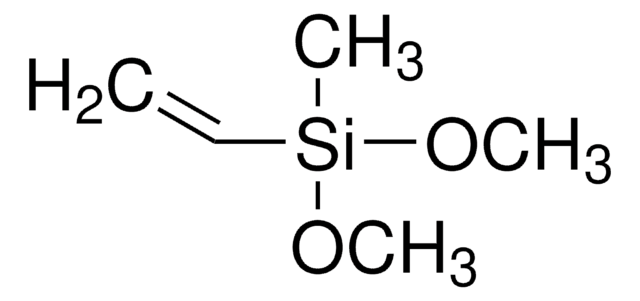679275
Triethoxyvinylsilane
≥98%, deposition grade
Synonym(s):
(Triethoxysilyl)ethylene, Vinyltriethoxysilane
About This Item
Recommended Products
grade
deposition grade
Quality Level
Assay
≥98%
form
liquid
refractive index
n20/D 1.398 (lit.)
bp
160-161 °C (lit.)
62-63 °C/20 mmHg (lit.)
density
0.903 g/mL at 25 °C (lit.)
SMILES string
CCO[Si](OCC)(OCC)C=C
InChI
1S/C8H18O3Si/c1-5-9-12(8-4,10-6-2)11-7-3/h8H,4-7H2,1-3H3
InChI key
FWDBOZPQNFPOLF-UHFFFAOYSA-N
Looking for similar products? Visit Product Comparison Guide
Signal Word
Warning
Hazard Statements
Precautionary Statements
Hazard Classifications
Eye Irrit. 2 - Flam. Liq. 3 - STOT SE 3
Target Organs
Respiratory system
Storage Class Code
3 - Flammable liquids
WGK
WGK 1
Flash Point(F)
93.2 °F - closed cup
Flash Point(C)
34 °C - closed cup
Personal Protective Equipment
Choose from one of the most recent versions:
Already Own This Product?
Find documentation for the products that you have recently purchased in the Document Library.
Customers Also Viewed
Articles
Mesoporous Oxides and Their Applications to Hydrogen Storage
atomic layer deposition (ALD), microelectronics, Mo:Al2O3 films, nanocomposite coating, photovoltaics, semiconductor devices, W:Al2O3 films, composite films, layer-by-layer
Silica is a very popular inorganic nanomaterial used in a wide range of applications including fillers for rubber, catalyst supports, separation media, carriers in food and agriculture, and abrasive/anticaking agents in cosmetics. It is also widely believed to be an important material for biomedical applications for following reasons.
Synthesis of Melting Gels Using Mono-Substituted and Di-Substituted Alkoxysiloxanes
Global Trade Item Number
| SKU | GTIN |
|---|---|
| 679275-50G | 4061838141064 |
Our team of scientists has experience in all areas of research including Life Science, Material Science, Chemical Synthesis, Chromatography, Analytical and many others.
Contact Technical Service









